Circadian rhythms: What time is your brain at its cognitive peak?

- A large study from the UK finds that college students perform best on exams taken in the early afternoon.
- Circadian rhythm, an aspect of the body’s internal clock that responds primarily to light, is likely at play here. Teenagers generally have “later” clocks, and thus are most wakeful in the afternoon.
- Your brain is at its cognitive peak at a time that lines up with your circadian rhythm. After age 20, this peak arrives earlier and earlier in the day for most people.
A new study conducted over five years at a large public university in the United Kingdom finds that college students perform best on exams taken in the early afternoon, likely because the time slot lines up best with their circadian rhythm, the biological process governing sleep-wake cycles.
The research was published December 12 in the Economic Journal.
The authors of the analysis, Alessio Gaggero and Denni Tommasi, both economists respectively based out of the University of Granada in Spain and the University of Bologna in Italy, examined 503,358 exam scores from over 50,000 anonymous undergraduate and graduate students between the 2014-15 and 2018-19 academic years.
The beauty of these exams is that students are essentially randomized to three time slots: “morning” at 9 am; “early afternoon” at 1:30 pm, or “late afternoon” at 4:30 pm, and students can only sit for one exam per day. Moreover, the scores aren’t curved, and are graded on a 0-100 scale. This setup afforded Gaggero and Tommasi a fantastic opportunity to gauge the time of day when college students are at their cognitive peak.
They found that students’ exam performance followed a U-shape, with optimal performance at 1:30pm. At this time of day, students’ scores were 0.068 standard deviations higher compared to the morning, and slightly above the late afternoon.
“The implication is that, all else being equal, individuals sitting an important cognitive assessment at an unfavourable time are disadvantaged,” the researchers wrote.
Circadian rhythms and cognitive performance
Based on the results, they hypothesized that circadian rhythm might be the determining factor. This part of the body’s internal “clock,” heavily influenced by light, affects everything from digestion to hormone production to cognitive performance.
To scrutinize their circadian hypothesis, Gaggero and Tommasi further delved into the data, finding three key pieces of supporting evidence.
First, students’ early-afternoon exam scores improved even more relative to the morning in January, when there’s much less morning light. Second, the time-of-day effect was much more pronounced for exams involving problem-solving, logical thinking, and abstract-reasoning, traits which past studies have shown to be more affected by circadian rhythm. Third, students under age 20 outperformed in the early afternoon to a much greater degree than students over that age. This makes sense, as people in their late teens have been found to have the “latest” biological clocks.
One potential concern about the study’s validity is that the researchers’ couldn’t verify the actual content of the exams. So it’s possible that students simply were given exams for harder classes in the morning and late afternoon. Still, there’s no indication that there was any difference in exam difficulty between the time slots.
A major implication of the study for education as a whole is that instructors should avoid scheduling important assessments in the early morning. In the U.S. and many parts of the Western world, major policy, funding, and college admission decisions are based on standardized testing scores, so it makes sense for schools to assess their pupils when they are at their cognitive peak.
More broadly, the results affirm that we should tackle mentally challenging tasks at times that line up with our circadian rhythm, when we are most wakeful. For teenagers, this is generally the early afternoon, while for adults, it can transition to mid-morning or even early morning for older adults.





